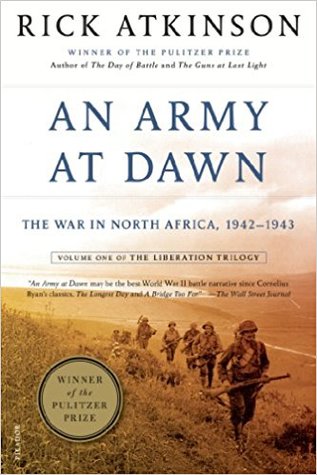More on this book
Community
Kindle Notes & Highlights
Read between
April 20 - September 22, 2020
Along with Stalingrad and Midway, North Africa is where the Axis enemy forever lost the initiative in World War II. It is where Great Britain slipped into the role of junior partner in the Anglo-American alliance, and where the United States first emerged as the dominant force it would remain into the next millennium.
Italian troops invaded Greece without warning on October 28, 1940—“Führer, we are on the march!” Mussolini exclaimed—and immediately found themselves so overmatched that Wehrmacht divisions were needed to complete the conquest and rout an ill-conceived British expeditionary force sent to save the Balkans.
Churchill’s chief military representative in Washington, Field Marshal Sir John Dill, told London that, notwithstanding the long prelude, American forces “are more unready for war than it is possible to imagine.”
Among the secret cargoes in sealed crates were six tons of women’s stockings and lingerie, to be used for barter with Moroccan natives.
For neophyte troops, this first combat experience was revealing: war was fought by ignorant armies on a darkling plain.
If ever he needed a bit more velvet, it was now. But Kent Hewitt had been at sea for too many years and was too fine a sailor to deceive himself. His velvet was gone.
Eisenhower’s signal officer proposed that the formula for staffing a headquarters should be “a reasonable estimate, multiplied by five.” AFHQ would remain in Algiers for years, expanding into a “huge, chairborne force” of more than 1,000 officers and 15,000 enlisted troops occupying 2,000 pieces of real estate.
“A man fights to help the man next to him,
It is axiomatic that commanders in conference tend to be on their best behavior and therefore at their least useful.
American fighter planes patrolled overhead and Patton’s sentries stood guard every hundred yards for 150 miles.
When a staff officer at Dunkirk told him, “Our position is catastrophic,” Alexander was said to have replied, “I’m sorry, I don’t understand long words.”
But when the U.S. command post went up in tents on a farm two miles northwest of town, one man was conspicuously absent: G. S. Patton, Jr. As Eisenhower had long intended, Patton had quietly surrendered the corps command in order to complete preparations for Sicily, now less than three months away. In forty-three days he had become a national hero, fought the best German tank forces to a draw, and gone far toward building a reputation as “our greatest fighting general,” in Franklin Roosevelt’s phrase. Yet—as perhaps even he realized—his tenure had been checkered at best. For all Patton’s
...more


